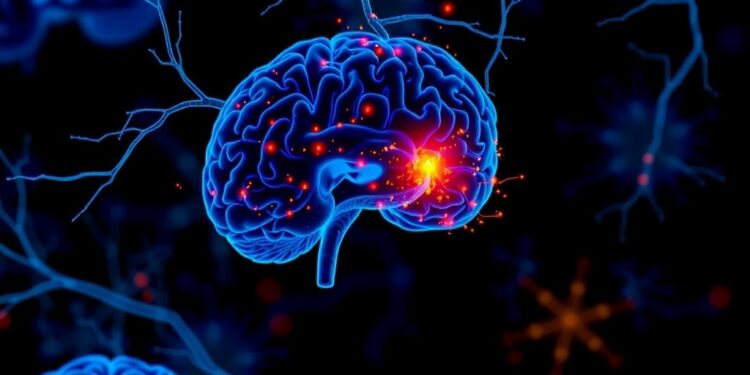
A groundbreaking study led by the University of Minnesota Medical School has received notable recognition following a three-year funding grant from the National Institutes of Health, amounting to a significant $1.2 million. This funding is dedicated to exploring the therapeutic potential of transcranial magnetic stimulation (TMS) as a promising treatment for youths suffering from Tourette syndrome and various tic disorders. Research predicts that this pioneering therapy could alter the traditional landscape of tic disorder treatments, offering renewed hope for families affected by these conditions.
Tourette syndrome, along with tic disorders, poses a considerable challenge, affecting approximately one in every 50 children. These conditions manifest as involuntary motor movements or vocalizations known as tics, which can be not only distressing and disruptive but also disabling in more severe cases. The prevalence of these disorders underlines the critical need for effective treatments beyond current options, which have shown limitations and inconsistent results over the years. The announcement of this study ignites hope that TMS could offer a novel approach to alleviate these debilitating symptoms in children.
Building on the insights gained from extensive clinical work and engagement with the Tourette community, the University of Minnesota Medical School’s research team has undertaken a two-phased clinical trial. The initial phase has confirmed the safety and tolerability of combining Comprehensive Behavioral Intervention for Tics (CBIT)—a widely accepted behavioral therapy—together with TMS in what is termed CBIT+TMS. Early findings show promising outcomes, indicating that this integrated approach not only enhances brain circuit function, crucially associated with tic regulation, but also contributes to symptom relief.
Dr. Christine Conelea, an associate professor and pediatric psychologist at the University of Minnesota Medical School, emphasized the motivation driving this innovative work. She stated, “Our results make us hopeful about the potential for CBIT+TMS to be a future treatment option that addresses these gaps.” This quote succinctly encapsulates the research team’s aspiration to not only expand the treatment horizon but also to address past shortcomings that have long plagued traditional therapies.
The next phase of this promising study is anticipated to commence with participant recruitment, slated for the spring of 2025. During this phase, researchers will delve deeper into understanding the impact of CBIT+TMS on both the neurological underpinnings and the symptomatic presentations of Tourette syndrome. The anticipated research seeks to unravel the complexities of how TMS interacts with the brain’s circuitry, thereby potentially transforming treatment paradigms for those affected by tic disorders.
TMS operates through non-invasive magnetic pulses aimed at specific areas of the brain, essentially modulating neural activity. In the context of Tourette syndrome, the specific brain circuits engage in tic generation, causing involuntary movements and sounds. Therefore, by employing TMS, researchers aim to recalibrate these neural circuits—effectively reducing the frequency and intensity of tics. If successful, this could mark the dawn of a new era in the management of Tourette syndrome, allowing for a significantly improved quality of life for affected individuals.
Scientific literature points to the broader implications of TMS therapy beyond tic disorders, illustrating its versatility in treating various neurological and psychiatric conditions. This makes the current research relevant not only for youths with Tourette syndrome but also for the broader study of brain-behavior relationships. As studies surrounding TMS gain traction, they pave the way for understanding how neurological interventions can enhance psychological health and vice versa.
Moreover, the incorporation of behavioral therapies like CBIT alongside TMS represents a significant shift toward integrative approaches in mental health treatment. This method acknowledges the importance of psychological, biological, and environmental interactions in the manifestation of tic disorders. A holistic treatment plan that leverages both behavioral and neurological interventions is a progressive step toward understanding and managing complex disorders.
If the ongoing trials prove successful, the applicability of CBIT+TMS could extend beyond Tourette syndrome, providing insights into its efficacy in treating a variety of neurological disorders characterized by motor and vocal manifestations. The implications for clinical psychology and neuroscience are monumental, opening avenues for innovative research and collaboration across disciplines.
As news about this research circulates, the scientific community is brimming with anticipation over the potential methodological advancements to emerge from the trials. A successful result could encourage further investment in neuropsychological treatments, fostering a new wave of exploration into the intersection of behavioral therapy and neuromodulation strategies.
In summary, this study is not just another clinical trial; it serves as a beacon of hope for many families grappling with the challenges posed by Tourette syndrome and tic disorders. As science continues to unravel the complexities of the brain, innovative treatments like CBIT+TMS may soon revolutionize how we understand and treat these often-misunderstood neurological conditions.
The University of Minnesota Medical School is a leader in advancing medical knowledge and training the next generation of practitioners. Their commitment to the Indigenous populations of the region demonstrates a profound respect for traditional lands and commitments to community improvement. This dedication underscores the broader societal implications of their research, serving not just the academic community but also those whose lives are affected by these conditions.
As researchers prepare to embark on this pivotal clinical trial, the future remains bright for alternative treatment options for Tourette syndrome and tic disorders, embodying the spirit of innovation and compassion that the medical community strives to uphold.
Subject of Research: Transcranial Magnetic Stimulation as Treatment for Tourette Syndrome in Youth
Article Title: Innovative Research into Transcranial Magnetic Stimulation Offers New Hope for Children with Tourette Syndrome
News Publication Date: January 22, 2025
Web References: Not applicable
References: Not applicable
Image Credits: Not applicable
Keywords: Tourette syndrome, transcranial magnetic stimulation, tic disorders, clinical trial, Comprehensive Behavioral Intervention for Tics, neuroscience, mental health, childhood disorders, neurological conditions, novel treatments, integrative approaches, University of Minnesota Medical School.
Tags: behavioral therapyCBIT+TMS therapyClinical Trialsinnovative treatmentsneurological research.neurostimulationNIH grantpediatric neurologytic disordersTourette syndromeTranscranial Magnetic Stimulation (TMS)University of Minnesota Medical School





